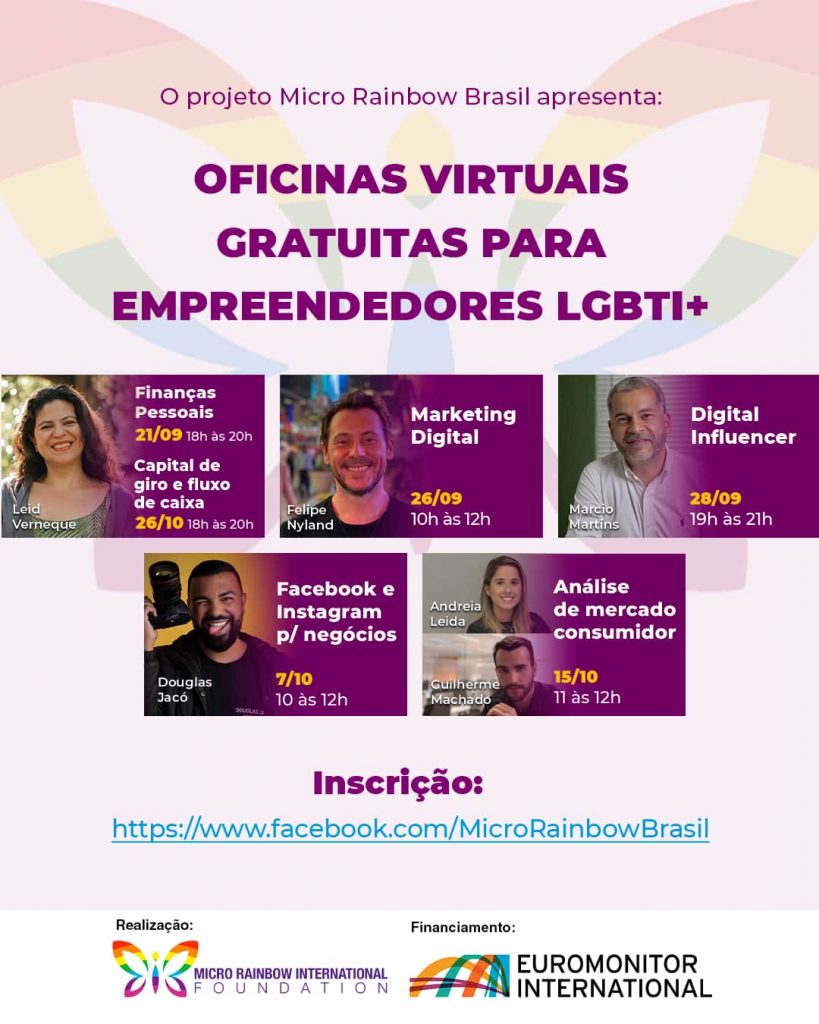The complexity of the current situation in Brazil which combines a serious economic and political crisis with the advance of the Covid-19 pandemic, disproportionately affects the self-employed and micro entrepreneurs, especially those living in poverty. Many of our beneficiaries had to interrupt their businesses and had not yet managed to build an emergency fund capable of supporting them at such a time. Some of them also struggle with mental health issues and other socioeconomic vulnerabilities and have faced a worsening situation of oppression and anxiety due to social isolation and increased financial restrictions.
Bearing this in mind, Micro Rainbow International Foundation decided to run an online survey to better understand the impact of the pandemic on our beneficiaries and other low-income LGBTI entrepreneurs in Brazil, in order to develop strategies to support them is this unprecedented crisis. The survey was carried out in August 2020, while we concluded our 7th small business training, held online for the first time due to the pandemic.
Respondents
A total of 118 people answered the survey, of which 30 were gay men, 29 lesbians, 27 trans women, 11 transvestites, 10 bisexuals, 8 trans men, 2 non-binary people and 1 person who identifies as transmasculine.
Half of the respondents were beneficiaries of the Micro Rainbow Brazil project in Rio de Janeiro and half were other low-income LGBTI entrepreneurs who are interested in our work and have not attended our small business training.
Our respondents have businesses in a variety of sectors. The most common are arts/culture, events, education, food, beauty/aesthetic, digital media, fashion, tourism, massage, as well as psychotherapy, holistic therapies and the non-profit sector.
Findings
This survey analysis provides an in-depth understanding of how MRIF’s beneficiaries and other low-income LGBTI entrepreneurs in Brazil have been coping with the Covid-19 pandemic and how it has affected their small businesses and personal lives. According to the 118 responses received, the pandemic impacted negatively on their businesses, reducing their sales or customers and making it difficult to deliver products or services. Many became indebted and had to shut down their businesses temporarily. Others were forced to stop house calls or change the scope of their businesses and decided to invest in digital sales and services.
| Ranking of impact on their small businesses | Respondents |
|---|---|
| Reduction in sales or customers | 48 |
| Temporary shutdown of the business | 34 |
| Difficulties in delivering products or providing services | 29 |
| Indebtedness | 23 |
| Interruption to house calls (by legal order or own decision) | 22 |
| Difficulty in buying production supplies | 18 |
| Migration to digital sales/services | 16 |
| Closing of physical store (by legal order or own decision) | 15 |
| Change of product/service | 12 |
| Bankruptcy | 7 |
| Migration to delivery services | 5 |
| Stock accumulation | 4 |
| Cancellation of contracts | 1 |
Most respondents reported an increase in mental health issues, including depression, anxiety and panic, combined with financial hardships and lack of work opportunities. They also reported greater levels of insecurity and fragility in this period as a result of homo or transphobia, thus reinforcing an urgent demand for actions which reduce the socioeconomic vulnerabilities of the LGBTI community during and after the pandemic.
| Ranking of impacts on their personal lives | Respondents |
|---|---|
| Negative impact on mental health | 80 |
| Difficulty in paying bills | 65 |
| Lack of work opportunities | 58 |
| Difficulty in buying food and essentials | 26 |
| Increase in LGBTIphobia | 22 |
| Moving house | 16 |
| Dismissal | 16 |
| Domestic violence | 8 |
| Homelessness | 4 |
Respondents also shared the strategies they adopted in order to alleviate some of the negative impacts of the pandemic. Prioritising and restructuring of their occupations and increase in physical and mental health care as well as support networks, especially of friends and family were the most common answers. Many respondents also emphasised how important it was to have access to emergency aid and to reorganise their personal finances in this period.
In addition, our respondents expressed a strong demand for learning or improving their professional skills, particularly in relation to virtual/digital tools. They also requested more training and support from MRIF, including opportunities to promote/advertise their businesses and increase networking, access to food baskets, seed capital, micro-credit, psychological support and business mentorship.
Workshops
Hoping to meet some of these requests, our Micro Rainbow Brazil team organised a programme of six free online workshops between 21 September and 26 October (see adverts below). Priority was given to the options with higher votes in the survey and according to the availability of our training delivery partners.
We hope that the data produced in this analysis will not only shed light on the challenges and strategies of low-income LGBTI entrepreneurs in this difficult historical period but also inspire future projects aimed at the LGBTI community.


